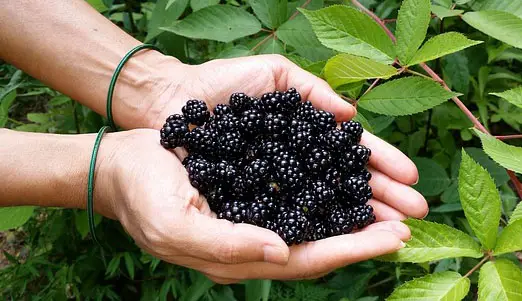
We may receive commissions from purchases made through links in this post, at no additional cost to you.
Like many people who grew up in the south, I always look forward to the summer blackberry season. Sweet, juicy homegrown blackberries are so superior to the commercial, grocery-store varieties. Just thinking about them makes my mouth water…
But the reality is, although growing blackberries is relatively simple, growing super-sweet blackberries can be a challenge. You may be thrilled with the size, abundance, and juiciness of your harvest, but then the tart taste is a serious disappointment. So why are homegrown blackberries often so sour? And what can you, the gardener, do to grow them sweeter?
Typically, sourness in blackberries is caused by early harvesting, inadequate sun exposure, improper watering, under-fertilizing, incorrect soil pH, or soil with insufficient organic material. To improve the berries’ sweetness, adjust harvest time and cultural practices, and focus on overall soil health.
Clearly, there are a lot of factors that could affect how sweet your blackberries grow to be. In this article, we’ll dig into them one by one. Hopefully, by the end, you will be armed with the information you need to troubleshoot those bitter berries.
Harvest Blackberries at the Right Time
The most common reason that homegrown blackberries are sour is, thankfully, also the simplest. Picking blackberries just a little too early can drastically affect how sour or sweet the fruit tastes. If you nail the perfect harvest time, you have a much higher chance of getting sweet berries.
Blackberries first show up as pale green, tight clusters on the plant. They then redden, grow larger, and eventually darken to a deep purple-black. This ripening process happens over several weeks, but once they’re picked the berries will not continue to ripen (unlike some other fruits). This is why berries at the store are usually so tart. They’ve been picked early so they hold up better to shipping.
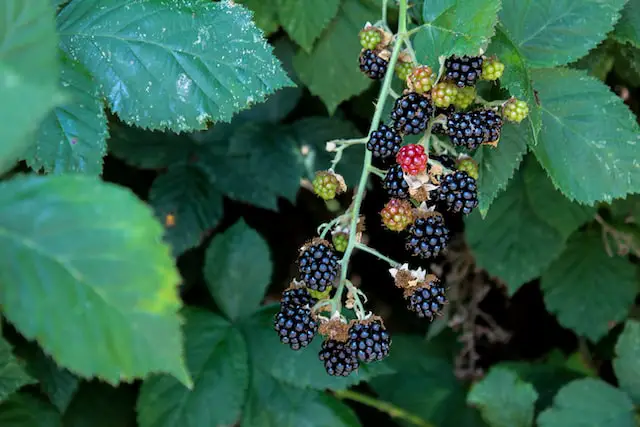
Blackberries are perfectly ripe when they are completely black, plump, and still firm, but have lost some of their shine. This typically happens 2-3 days after the berry first turns black. After a few days, the shiny blackberry will look a little duller – that’s the perfect time to pick.
Related: White Spots on Blackberries: What’s the Cause?
Ripe blackberries should come off easily in the hand with no resistance. If you have to tug on a berry to remove it from the bramble, then it’s not ready yet.
Harvest blackberries every few days to keep yourself from accidentally picking underripe ones. Picking on a sunny day may help the berries to be even sweeter, although avoid picking when the temperatures are hot. I prefer to pick my blackberries in the morning when the sun is up, but it’s not too hot yet.
Once the berries are picked, keep them out of direct sunlight. Store them in a shallow container and refrigerate them right away. Don’t wash the berries until you are ready to eat. They should last about 5 days in the fridge (although mine never do because they are always eaten much sooner).
Learn more: How to Wash and Store Blackberries to Stay Fresh Longer
Adjust Soil pH and Add Organic Material
If you are already harvesting your blackberries at the right time, the next thing to consider is the pH of your soil and its overall health. The pH (how acidic or alkaline the soil is) affects how well a plant’s roots can absorb nutrients. And when it comes to the sweetness of blackberries, having the right pH and soil composition could make all the difference.
pH for Blackberries
Blackberries fruit best when the pH is between 5.5 and 6.5 (fairly acidic). There’s some evidence that blackberries will be sweeter with a pH on the lower side, even as low as 4.5. Since most garden soils fall in the 6.0-7.0 range (slightly acidic to neutral), some amending may be necessary for sweeter blackberries.
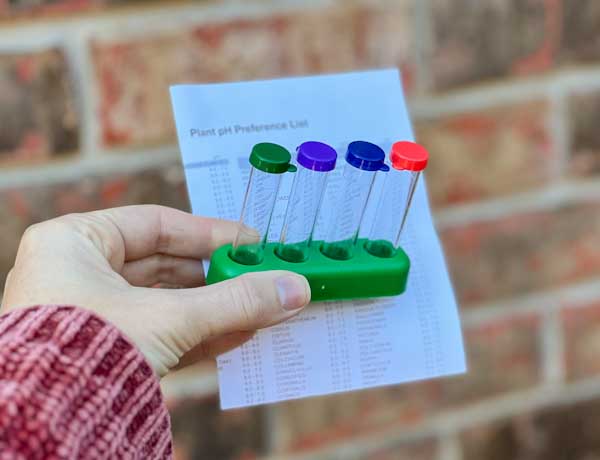
The first step is to test the pH of your soil. Acidifying the soil will only help if it’s what your particular dirt actually needs. I use a soil pH test kit like this one (which also checks for nitrogen, phosphorus, and potash levels). Follow the package instructions to determine the pH level of your blackberry planting site. If you’ve checked the pH elsewhere in your garden, don’t assume it’s the same everywhere; go ahead and test each area.
Once you know your soil’s pH, you can take steps to increase or decrease the acidity with different amendments. If your soil is too acidic, add some garden lime or dolomite lime to make it more alkaline.
To make the soil more acidic, add an acidifying product such as soil sulfur or aluminum sulfate. Again, always follow product instructions to determine how much you should use in each application. I also recommend digging in some ground pine bark mulch, which will add acidity over time as it decomposes.
If your soil has the wrong pH, the blackberry plant’s roots won’t be able to absorb the minerals it needs to fruit its best, resulting in sour fruit. But pH isn’t the only soil-related factor that could affect berry sweetness.
Do you suspect you may have planted your blackberries in the wrong spot? Find out how to move them here: Transplanting a Mature Blackberry Bush: Tips to Do It Right.
Healthy Soil Means Higher Brix
One of the biggest factors determining the sweetness and overall flavor of blackberries (and every other fruit and vegetable) is the Brix level. Simply put, Brix is the measure of the total soluble solids in a plant, including sugars, acids, vitamins, minerals, and other compounds. In general, the higher the Brix, the sweeter the fruit.
If the Brix level is higher, it means that the plant is absorbing adequate minerals and nutrients from the soil (which also connects to the pH discussion above). Adequate mineral uptake means the plant will be able to produce more sugars, thereby increasing the health of the plant (and the sweetness of the berries!).
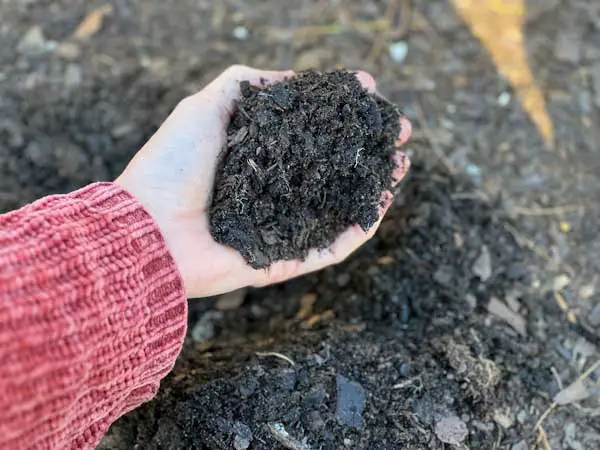
So how do you get your blackberries to have a higher Brix level? It all starts with the soil. The balance of the proper pH level, calcium and other micro- and macronutrients, and plenty of bustling microbial life in the soil will benefit the plant’s Brix. Essentially, better soil means a happier plant, which leads to sweeter blackberries.
Once you’ve adjusted the pH, turn your attention to the overall health of the soil. Blackberries will provide sweeter fruit in soil that is rich in organic matter. Ingredients like earthworm castings, mycorrhizal fungi, compost and compost tea, humic acid, rock dust, and seaweed will all increase beneficial microbial activity in the soil.
Adding a soil conditioner is a great way to ensure that you are feeding the soil’s microbiome. Look for a mix of the above ingredients, and a variety of micronutrients represented. For example, conditioners with humic acid will make iron more available to the plant, which helps with photosynthesis and the development of sugars.
Below are three soil conditioners I recommend, all of which will benefit your blackberry bushes (and other garden plants!), hopefully resulting in sweeter berries.

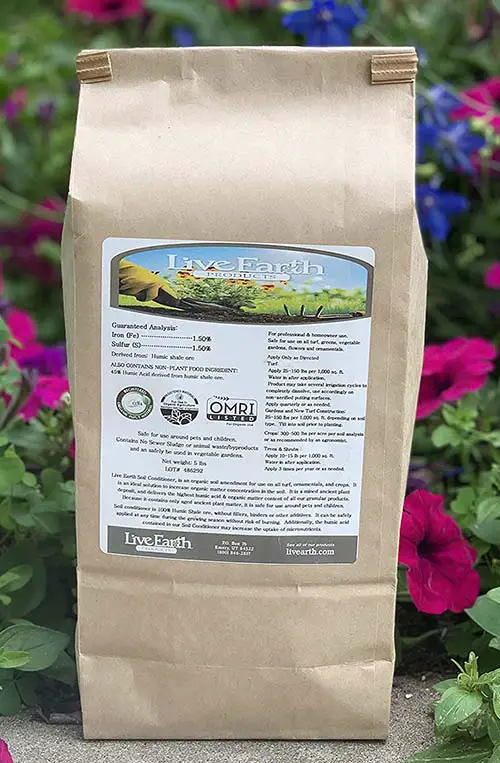
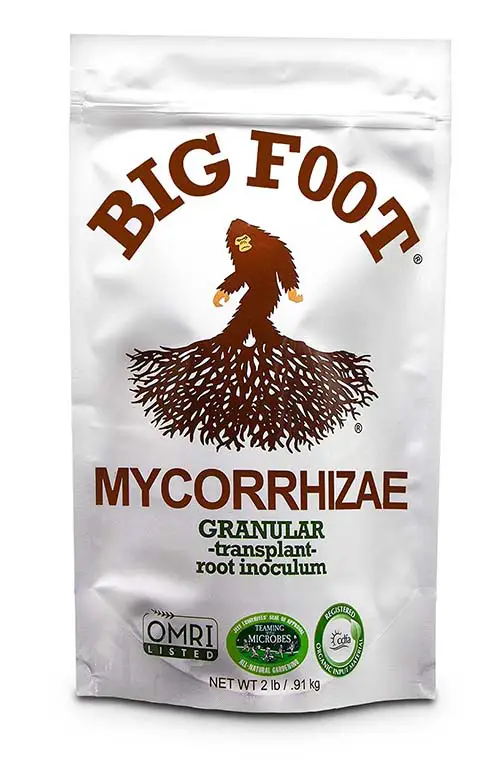
- Fox Farm Happy Frog Soil Conditioner – I love the products from this brand. This conditioner contains pH-balanced forest humus, earthworm castings, bat guano, beneficial microbes, and humic acid. It stimulates root development and helps plants access more micronutrients in the soil.
- Big Foot Mycorrhizae Granular – This is a great choice for new blackberry plants, as the mycorrhizal fungi enhances root health and helps prevent transplant shock. This product also includes worm castings, biochar, kelp, humic acid, and other minerals.
- Live Earth Products Organic Soil Conditioner Granules – This product is derived from aged plant matter and contains a high amount of humic acid, which increases the uptake of micronutrients.
Another soil-enhancing practice is to lay a thick layer (3-4 inches) of well-rotted manure or other compost under your blackberry plants in the fall. The compost will break down over the winter and feed your soil, and in turn, the plant.
If your aim is to increase the blackberries’ sweetness (which I assume it is, since you’re reading this article), use minimal synthetic fertilizers. The salts present can disrupt the beneficial microbes in the soil. Synthetic fertilizers also contain less of the micronutrients that are essential for soil health.
Sun, Water, and Weather
Light is a major factor in determining how sweet any fruit will be. Blackberries, like most other fruits, need full sun exposure in order to ripen fully and develop the most sugars. Plant blackberry bushes in areas that receive at least 6 to 8 hours of sun per day. In hot climates, a little afternoon shade can be a good thing and can protect the plant from heat stress – as long as it still receives enough total sunlight.
Pruning will also increase sun exposure to the berries. At a minimum, prune away berry-producing canes (called floricanes) after the fruit has been harvested at the end of summer. And in early spring, before bloom, select only the strongest 4 to 6 canes to keep and trim the rest to soil level.
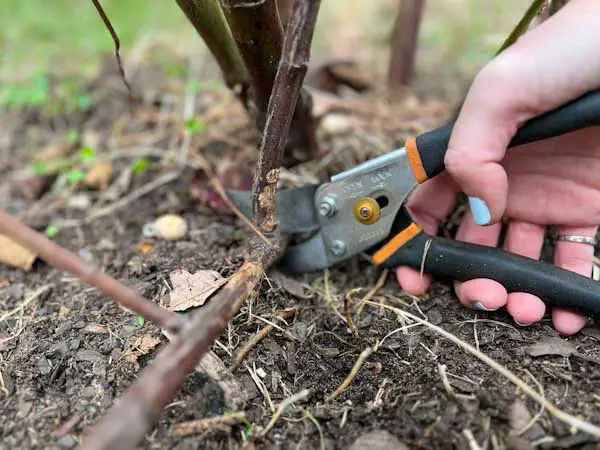
To find out more about pruning blackberries for bigger (and sweeter!) fruit, check out my article The Ultimate Guide to Pruning Blackberries (with Photos).
As the berries develop on the canes, it’s important to water regularly and deeply. Blackberry plants like moist, but well-drained soil. They can tolerate some short periods of drought once the fruiting is done, but while there are berries on the plant, make sure to water often, about once a week (depending on weather). Sour berries are often the result of under-watering.
One caution, however: heavier-than-normal rainfall or watering right before harvest can result in a watered-down, diluted flavor. As with so many things in gardening (and life!), it’s a balancing act.
Many people opt to grow blackberries in raised beds to better control soil drainage. With raised beds, it’s easier to customize and amend the soil, adjust irrigation, and improve drainage. Also, if your soil is particularly sandy, you may need to water a little more often, about twice a week. Blackberries do well in sandy soil, but it can drain a little too quickly.
Sometimes, blackberry plants that grew sweet berries in previous seasons may suddenly produce sour ones. This may be caused by a slower-than-usual ripening period due to very dry or unusually cool weather for the season. Other changes in the environment, such as shading from other growing plants, could also cause such a flavor change.
Fertilizing
Tart blackberries may also be caused by inadequate fertilizing. Generally, blackberry plants are not overly nutrient-demanding, compared with some other fruits. And if you have healthy, fertile soil, you may need minimal extra fertilizing (go back to your soil test kit to see the levels of macronutrients in your soil).
But in many cases, blackberry bushes will produce better, sweeter fruit when provided with additional nutrition. Commercial growers often recommend a nitrogen-heavy (or even nitrogen-only) fertilizer for blackberries. Nitrogen is the primary nutrient needed for blackberries to grow and fruit, but it is certainly not the only one.
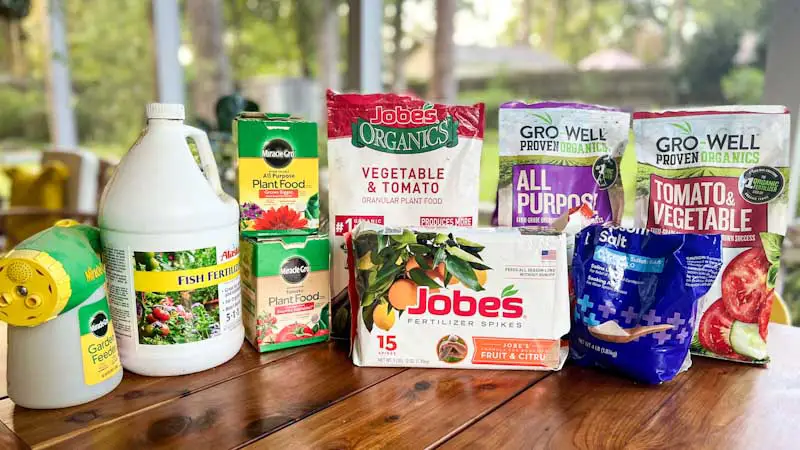
For home growers, a balanced-NPK fertilizer, or one that is slightly more nitrogen-forward is best. Read the package instructions to determine how much to use.
Learn more about how to feed blackberries in Blackberry Fertilizing: What to Use to Grow the Best Berries.
I prefer using organic fertilizers wherever possible. Organic fertilizers have lower NPK concentrations and are therefore gentler on the plants. They are derived from natural ingredients and typically include more micronutrients that are broken down in the soil and made available to the plant. This is better for the soil, which over time is much better for the plant.
Feed your blackberry bush once right as the plant begins to bud, to help the development of fruit. Feed again after the berries have been harvested, to encourage new canes (called primocanes) to grow.
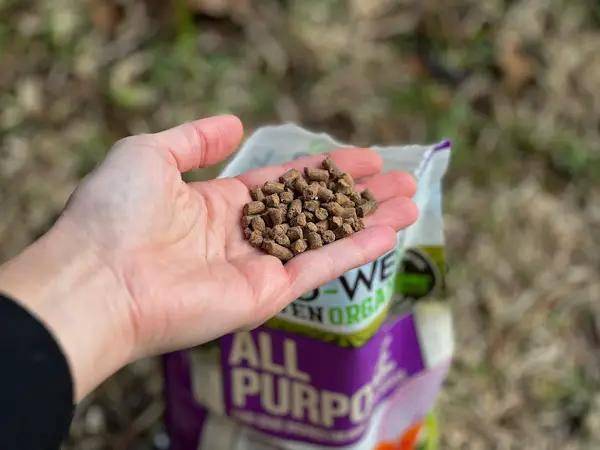
My recommendations:
Refer to your soil test to decide which fertilizer to try. If you’re lacking in nitrogen, choose a fertilizer with a higher first number (nitrogen), such as Dr. Earth. The Jobe’s Fruit and Citrus fertilizer contains more phosphorus and potassium (the second and third numbers), which will promote fruiting. The Espoma is a good all-around, essentially balanced choice.
- Dr. Earth Natural Wonder Organic Fruit Tree Fertilizer (5-5-2)
- Espoma Organic Berry-Tone Fruit and Berry Food (4-3-4)
- Jobe’s Organics Fruit and Citrus Granular Plant Food (3-5-5)
The Sweetest Blackberry Varieties
In some cases, blackberries could be sour simply because of the variety that’s been planted. Just like there are cultivars that grow larger or more prolific berries, some blackberry varieties are just plain sweeter than others. Below I’ve listed a few of the sweetest varieties you can grow.
Learn more about the best blackberry cultivars in my Blackberry Variety Breakdown: Biggest, Sweetest, and More.
1. Navaho
Navajo blackberries are exceptionally sweet, with a high sugar content. The plant is erect, thornless, and tolerates clay soils. The canes are very vigorous and high-yielding, but the berries are smaller than some other varieties. Zones 6-10
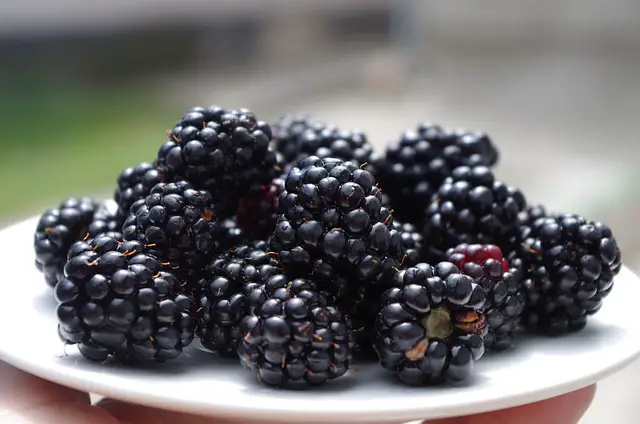
2.Triple Crown
This thornless blackberry grows semi-erect. It is very prolific, producing sweet, large berries with good flavor. Triple Crown is regarded as one of the most reliable, sweetest blackberry varieties. Zones 5-9.
3. Apache
Apache produces very large, juicy, sweet berries with very high yields. The bushes are erect and thornless. The berries ripen later in the season (July in most locations), with a long fruiting period. Apache tolerates cold well and is resistant to rust. Zones 5-9.
4. Arapaho
Arapaho blackberry plants are erect and thornless. They produce firm, sweet, medium-sized berries with very small seeds. Arapaho is known as one of the best tasting blackberry varieties. Although it’s not as prolific as some other cultivars, it is one of the earliest ripening blackberries (May to June) and is also resistant to double blossom disease and rust. Zones 4-9.
5. Darrow
Darrow is an erect, thorny blackberry that is very cold-hardy. It produces large, sweet berries late in the season, sometimes with a bumper crop in fall. The canes are very vigorous and can tolerate temperatures as low as -22°F. Zones 5-10.
What to Do with Sour Blackberries
After everything, if you end up with an excess of tart blackberries, don’t despair. There are a few tricks you can use to make those sour berries more palatable.
For one thing, douse them with something sweet. Maple syrup, honey, sugar or sugar substitute – all will help balance the sourness of the berries.
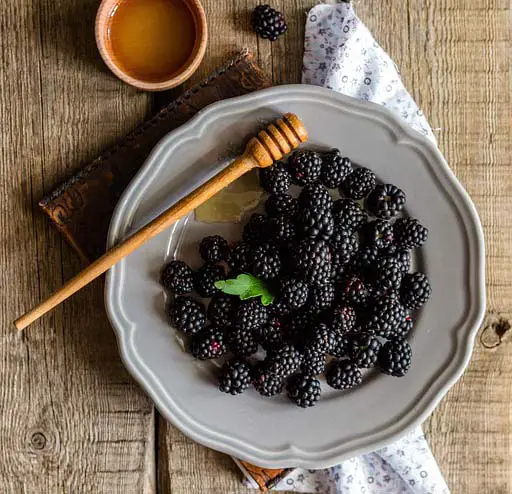
When in doubt, cook them. Heat breaks down the bitter compounds in the blackberries. Make jam or preserves, (try my Blackberry Blood Orange Marmalade) or add them to a sauce (blackberry barbecue sauce sounds pretty great). Salt also reduces our ability to taste bitterness, so incorporate sour blackberries into savory dishes. (Or, make Salted Honey and Blackberry No-Churn Ice Cream!)
Blackberries pair well with fatty meats such as steak, pork, or duck. That’s because fat will balance the tart flavors of less-than-ideal blackberries or other fruit. The same is true when serving blackberries with full-fat cream.
Combine several of these techniques for a delicious quick dessert (of course, this recipe will be even more delicious with your homegrown, super-sweet blackberries next season):
Macerate tart berries by sprinkling them with a little sugar and letting them sit for 20 minutes or so (this softens the berries and brings out the juices). Add a tiny pinch of salt to balance any remaining bitterness. Then serve the macerated berries over a toasted slice of pound cake with a big dollop of whipped cream or ice cream.
Read about how to properly freeze your blackberry crop here: Freezing Blackberries: The Best Ways to Do It.

